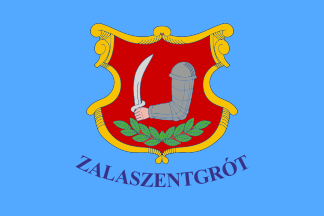 zachary harden
zachary harden
Keywords: zalaszentgrot | zala |
Links: FOTW homepage | search | disclaimer and copyright | write us | mirrors

Last modified: 2023-06-03 by  zachary harden
zachary harden
Keywords: zalaszentgrot | zala |
Links: FOTW homepage |
search |
disclaimer and copyright |
write us |
mirrors

image by Zoltan Horvath, 16 July 2010
See also:
Other sites:
"The origin of the eponym - One of the most important data
of the town is 1083 or 1084, which years are supposed to be the
years of the naming, however, no written evidence can prove it.
According to the experts who deal with the history of the
settlement it got its name after St. Gellért bishop. The bishop
who died as a martyr was declared a saint in 1083 or 1084,
therefore the settlement could get its name after him only after
his death. There are some written evidence in connection with the
naming from 1491, which is a certificate of Ulaszlo II.. In this
document he gave Szent Gót to the Hagymasy family as a present.
According to the Pray codex the certficate included the
following: Nikolai Hagymas e St. Giróth , however, it
was mentioned as Zend Geród as well.
Giróth is supposed to be the same as Gellért, and Geród is the
same as Gerard, which can be abbriviated as Grót. Szent Grót is
most probably the abbriviated form for St. Gerard that
could possibly originate from the name of St. Gellért. The first
written evidence for the existence of the settlement is from
1247. In order to understand this document you should go back to
the Türje clan, the owner of Szentgrót. The first well-known
person of the clan is mentioned namely as Gecse or Géza who had
the
name Szentgiroliti then Szentgrót
. His son was Dénes, the ban and later palatine of Hungary who
founded the Premonstratensian abbey. He is mentioned in the
certificate as Dénes master ban from Szent Gerard who was given
the abbey that was established by himself in addition with four
holdings, a two-wheeled mill by the bank of the River Zala, and
half of the amount of the taxes as well. The donation was
approved by Béla IV. and he ordered the chapter of Veszprém to
inaugurate the Premonstratensians of Türje. It happened on 22th
September 1247."
"Szentgrót, the 100th town - In 1949 the population of
Szentgrót was 3.683. In 1950 Kisszentgrót was atteched to the
settlement and since then up to 1963 Zalaszentgrót was a seat of
the region with its independent council. After the war a
significant improvement was started during which the co-operative
movement was introduced. Beside the agriculture, the distilling,
textile and wood industry, the brick factory and wine-growing and
vegetables processing plants were installed. Aranyod and
Tüskeszentpéter was attached to the town in 1963 and after it
lost its seat role in the region n 1978 the following settlements
were united with Zalaszentgrót by 31st December 1983: Csáford,
Tekenye, Zalaudvarnok and Zalakoppány. Zalaszentgrót was given
the title of being a town on 1st January 1984 after the
attachment was ended. This was the 100th time to give the rank of
being a town in the country. According to the current process
that went through the country at that time, the court, the deputy
office, the public prosecutor s office and the police station was
closed in Zalaszentgrót."
2001 Population Census: 8,034 inh. Ethnic affiliation: Hungarian:
95,9%; Gipsy: 1,6%; German: 0,4%; unknown, did not wish to
answer: 3,6% Religion: Roman Catholic: 78,4%; Greek Catholic:
0,1%; Calvinist: 1,5%; Lutheran: 1,0%; belonging to other
church/denomination: 0,7%; does not belong to any
church/denomination: 7,8%; unknown, did not wish to answer:
10,5%.
Sources: <www.szentgrot.hu>,
<helynevtar.ksh.hu>.
István Molnár, 15 January 2006
Home page of town (including image of proper colours of coat of arms):
www.szentgrot.hu/
Zoltan Horvath, 16 July 2010
Flag of Zalaszentgrót town (coat
of arms on blue field) can be seen at <www.zalamedia.hu>.
István Molnár, 29 March 2001
Resolution No.1/1992.(I.31.) about the Coat of Arms, the Flag
and the Seal at <www.szentgrot.hu>.
István Molnár, 15 January 2006
Its flag is light blue, with darker red shield,
and the inscription is placed in an arc.
Zoltan Horvath, 16 July 2010
za-zt.jpg)
image from <natloz.znet.hu>,
located by István Molnár, 15 January 2006
From <www.szentgrot.hu>:
"The coat of arms of Zalaszentgrót
The coat of arms is a shield framed with a golden wave line and
with a pointed bottom. There is an arm in armour holding a
floating short silver sword in the red part under which a green
bay branch is situated. The arm in armour holding a short silver
sword symbolises the boarder castle battles, and the bay branch
stands for the heroism of the fights. The leaders of the town
gave this definition of the coat of the arms of the town in
December 1991. It has been valid ever since and can be discovered
in the market town history of Zalaszentgrót. The question
of a shield came up in connection with the town rank that was
lost and given back in 1984. The leaders of the town [in 1984]
made some changes on the shield that is divided into two parts by
a wave symbolisig the River Zala: in the upper part the former
castle can be seen on a blue background and beside the castle as
a result of the era a red star as well. In the lower part of the
shield the arm in armour that has already been
mentioned was placed. This shield was valid only for 17 years,
until 1991."
You can see here
the the original historical pre-1949 and present coat of arms
since 1991. Here is
the communist era coat of arms (1984-1991) and here
is the official seal of Zalszentgrót in 1908.
István Molnár, 15 January and 2 February 2006
Description of coat of arms and some historical background (in English):
www.nemzetijelkepek.hu.
Zoltan Horvath, 16 July 2010